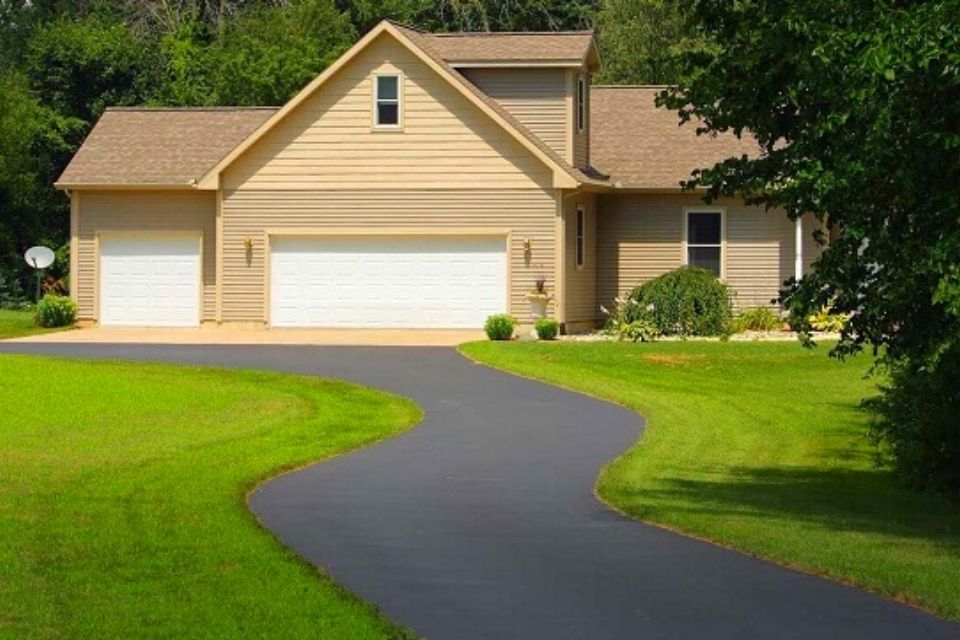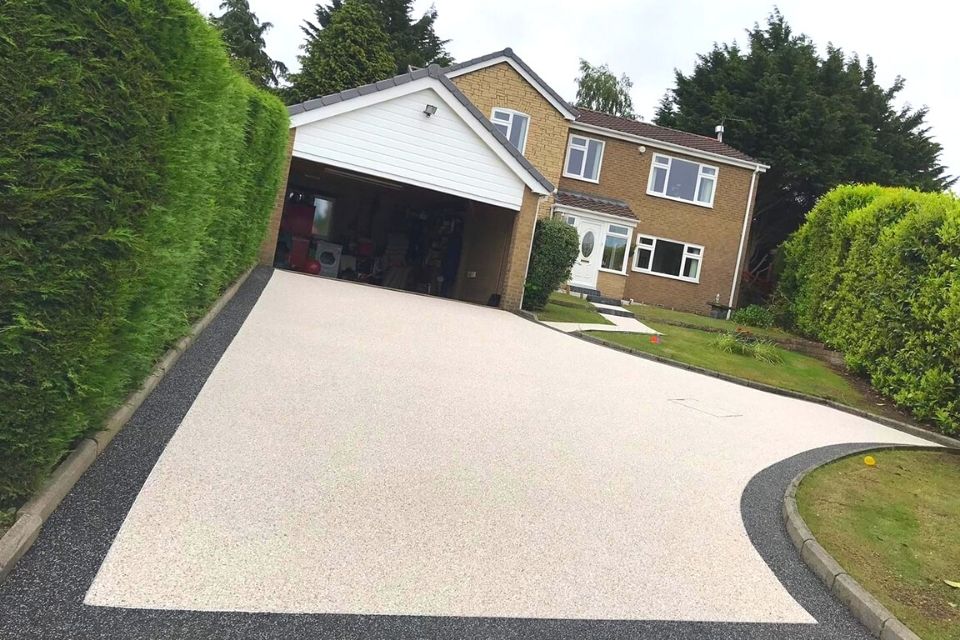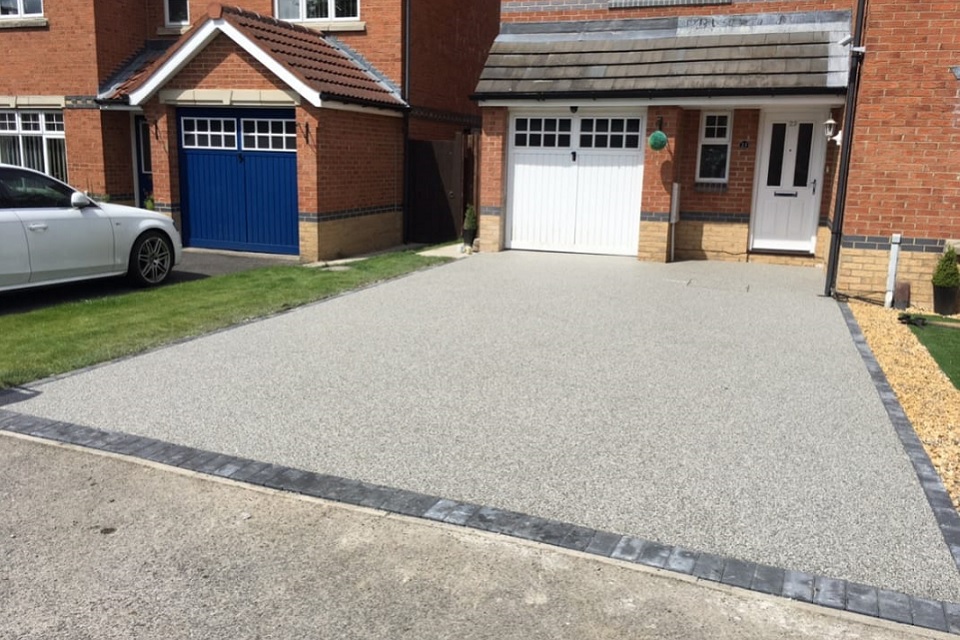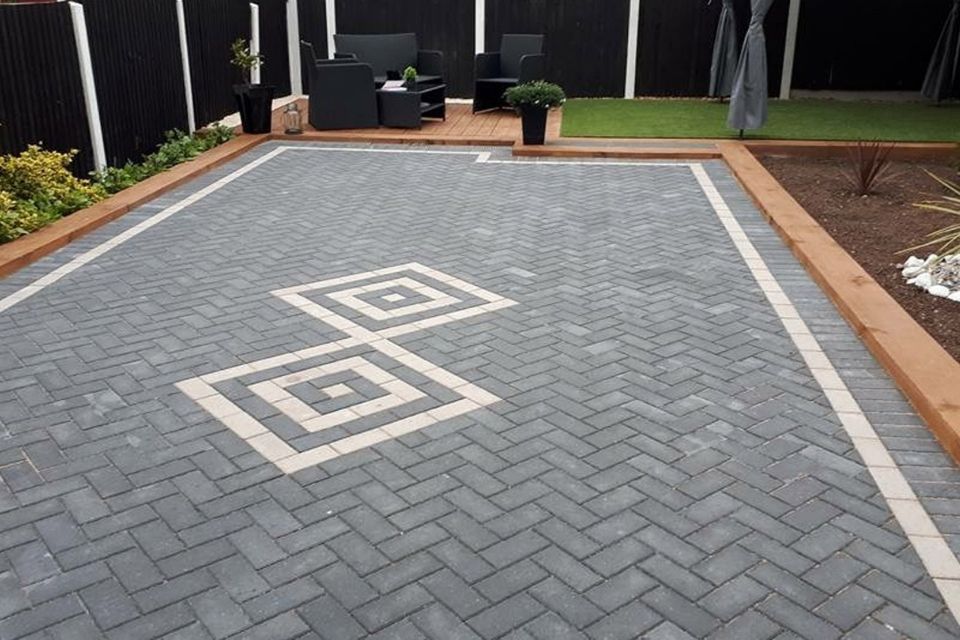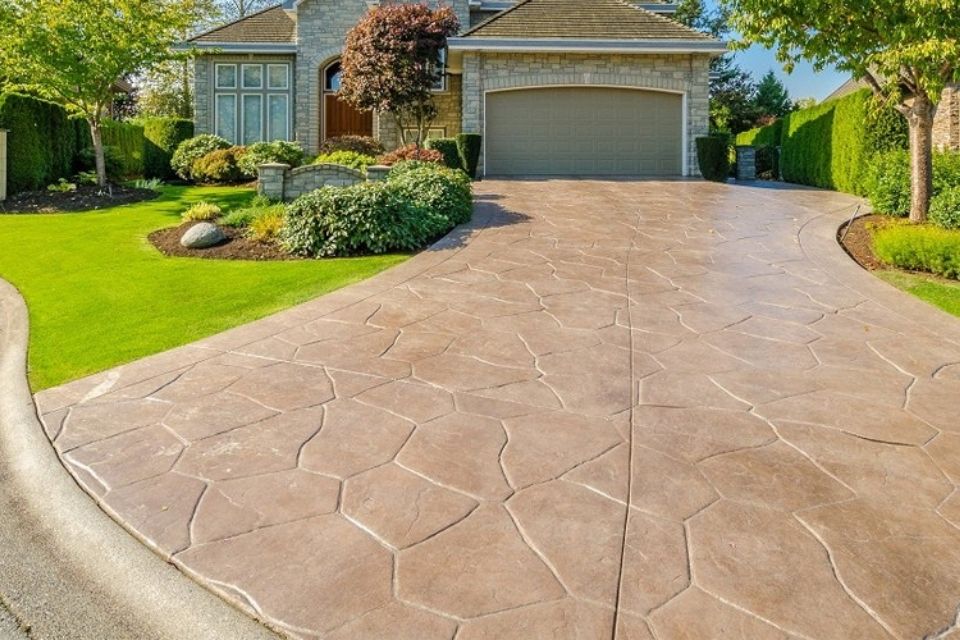What Is a Tarmac Driveway?
A tarmac driveway is a type of driveway made from a mixture of aggregates, such as crushed stone, gravel, or sand, and bitumen, a sticky, black, and highly viscous petroleum-based substance.
The specific proportions of aggregates and bitumen can vary depending on the desired properties of the tarmac. Tarmac driveways are known for their durability, low maintenance requirements, and cost-effectiveness.
Definition of Tarmac
Tarmac, short for tarmacadam, is a durable surface material that is suitable for various applications, including driveways, roads, and commercial spaces.
It is a popular choice for homeowners due to its durability, cost-effectiveness, and low maintenance requirements.
How Much to Tarmac a Drive?
What are the average costs of laying a tarmac driveway?
New driveway installation costs can vary quite significantly. The average cost of having red tarmac installed for a 20m² area is £1,400 to £1,800, with costs rising to £2,800 to £3,400 for a 40m² surface, £4,100 to £4,900 for 60m², £5,400 to £6,400 for an 80m² area, or £6,800 to £8,000 for a 100 square metre area.
The tarmac drive cost per square meter typically ranges from £70 to £120,, depending on location and drive size. Tarmac drive costs can vary based on factors such as the shape of the drive, removal of existing materials, and whether overlaying an existing tarmac surface.
Tarmacadam, aka tarmac, will help not only improve the appearance of your driveway but it will extend its lifespan too.
What about black tarmac driveway prices?
If you’d prefer black tarmac, this could cost approximately £1,000 to £1,400 for a 20m² surface, £1,900 to £2,600 for 40m², £2,900 to £3,700 for 60m², £3,900 to £4,900 for an 80m² area, or £4,800 to £6,000 for a 100m² driveway.
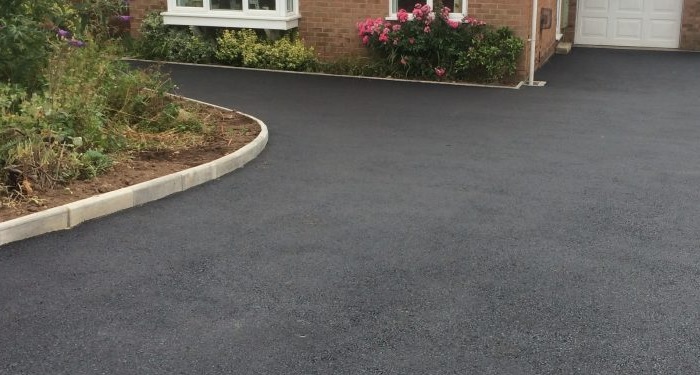
What can you expect to pay for cold-lay tarmac driveway?
When it comes to cold-lay driveway tarmac, the cost of installing a tarmac driveway would be about £1,400 to £2,200 for a 20m² area, £2,500 to £3,600 for a 40m² driveway, or £3,600 to £5,000 for a 60m² area. You’d need a budget of £4,700 to £6,400 to cover a surface of 80m², or £5,800 to £7,800 for a 100m² area.
How much will hot-lay tarmac driveways cost?
When it comes to hot-lay tarmac, the cost of installing a tarmac driveway will land about £1,600 to £2,400 for an area that is 20m², £2,900 to £4,000 for 40m², or £4,200 to £5,600 if it’s 60m².
For an area that is 80m² altogether, expect the cost to be around £5,500 to £7,200 and to cover a 100m² surface would likely cost between £6,800 and £8,800.
Here's a handy maintenance tip for your new tarmac driveway - to keep your driveway looking new, sweep away any debris and hose it down using low water pressure.
Let's take a deep dive into the prices you can expect to pay based upon the above...
Tarmac Prices
The following tables indicate costs for different types of tarmac, based on a range of sizes to help estimate a price for your driveway.
Red Tarmac Prices
| Area Size | Cost |
|---|---|
| 20m² | £1,400 to £1,800 |
| 40m² | £2,800 to £3,400 |
| 60m² | £4,100 to £4,900 |
| 80m² | £5,400 to £6,400 |
| 100m² | £6,800 to £8,000 |
Black Tarmac Prices
| Area Size | Cost |
|---|---|
| 20m² | £1,000 to £1,400 |
| 40m² | £1,900 to £2,600 |
| 60m² | £2,900 to £3,700 |
| 80m² | £3,900 to £4,900 |
| 100m² | £4,800 to £6,000 |
Cold-Lay Tarmac Prices
| Area Size | Cost |
|---|---|
| 20m² | £1,400 to £2,200 |
| 40m² | £2,500 to £3,600 |
| 60m² | £3,600 to £5,000 |
| 80m² | £4,700 to £6,400 |
| 100m² | £5,800 to £7,800 |
- What Is a Tarmac Driveway?
- How Much to Tarmac a Drive?
- What are the Supply Costs of a Tarmac Driveway Installation?
- What Additional Tarmac Driveway Costs Are There?
- Factors That Affect Tarmac Driveway Costs
- Tradesmen Costs for Tarmac Driveway Installation
- How Long Does It Take to Build a Tarmac Driveway?
- Types of Tarmac Driveway
- Benefits of a Tarmac Driveway
- Planning Permission and Building Regulations
- How Much Does It Cost to Remove a Tarmac Driveway?
- FAQs
- Sources
What are the Supply Costs of a Tarmac Driveway Installation?
In this section, we’ll break down the supply costs of installing a tarmac driveway. This excludes the labour costs.
If you decide to go about this as a DIY project, you’ll need to consider a range of tarmac driveway ideas.
Only experienced DIY enthusiasts should try to build a driveway by themselves as it is a complicated process.
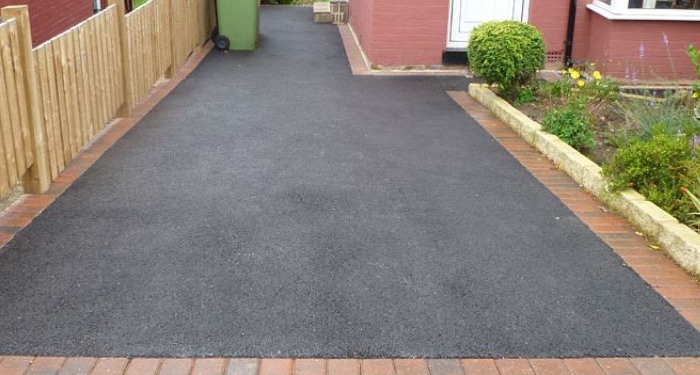
The average supply tarmac prices for cold-lay tarmac is £8 to £15 per 25kg with the cost of hot-lay tarmac landing around £45 to £60 per tonne, making hot-lay tarmac or hot-mix tarmac a much cheaper alternative to the former.
To be more specific about the types, red tarmac costs roughly £60 to £70 per square metre, with black tarmac costing about £40 to £50 per m².
To be more specific about the types, red tarmac costs roughly £60 to £70 per square metre with black tarmac costing about £40 to £50 per m².
As for edging, this costs approximately £5 to £40 per m².
Supply Cost of a Tarmac Driveway
| Type | Cost |
|---|---|
| Cold-Lay Tarmac Driveway | £8 to £15 per 25kg |
| Hot-Lay Tarmac Driveway | £45 to £60 per tonne |
| Red Tarmac Driveway | £60 to £70 per m² |
| Black Tarmac Driveway | £40 to £50 per m² |
| Tarmac Driveway Edging | £5 to £40 per m² |
What Additional Tarmac Driveway Costs Are There?
There are a range of added costs that you may incur when having a tarmac driveway installed. Let’s break down some reasonably common examples.
Minimum Fee
Being charged a minimum fee is common practice, especicially for smaller jobs. Although this may not apply if the cost of installing your driveway is over an above this regardless.
This may be included as a standalone fee or in the form of another cost being expanded – for example, if you were charged per day for labour.
In that scenario, if a job lasted 3 days and 2 hours or 3 days and 6 hours, you’d face a charge for 4 days of labour either way.
Installation Area
The state and type of installation area being used is also relevant to the cost for a number of reasons.
Firstly, there may be a need for additional work to make the installation area more suitable for having a driveway constructed.
On the other hand, it may simply be more difficult an area to work with regardless when it comes to installing the driveway.
Type and Materials
As discussed, there are many types of tarmac driveway, including red, black, and those with edging. They can also be categorised based on the way they are installed or the method used, namely, cold-lay tarmac and hot-lay tarmac.
Compared to block paving driveways, which are more expensive and require more labour during installation, tarmac driveways are often seen as a more cost-effective and less labour-intensive option. Tarmac driveways can typically withstand heavy traffic without cracking, making them a durable choice.
Size
Of course, the larger the driveway, the more materials will be needed and the longer the work will take. As a result, the supply and labour costs will be higher.
Foundations
As for the foundations, the more suited a foundation, the easier laying a tarmac driveway will be and vice versa. This, in turn, will shape the labour cost of installing a tarmac driveway.
Number of Tradespeople
The more people working on a project, the higher the labour cost will be. However, with more labourers on site, the installation of the driveway would be faster.
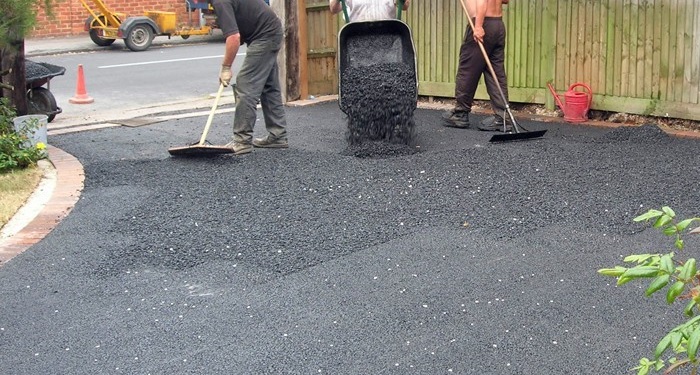
For that reason, it’s hard to say whether increasing or decreasing the number of labourers installing a driveway will be a cost-benefit or disadvantage overall.
It would mostly depend on how well the labourers work as a team.
Duration
The longer it takes to install a tarmac driveway, the higher the labour costs will be in most cases.
The only exception might be if the labour cost is a set amount prior to work commencing.
If you are charged per day of labour, then whether the work took 1 day and 3 hours or 1 day and 8 hours, you’d pay for 2 days of labour.
Repair Work
Over time, you may need to have repair work performed on a tarmac driveway. You should reseal your driveway approximately once every 3 years. Resurfacing should take place approximately every 5-10 years.
Another issue that may arise over time is the appearance of a crack. These issues could be fixed DIY for a relatively low price but you may pay several hundred pounds for any of these jobs if you hire a professional.
Cold-lay tarmac material is a convenient option for small repair jobs and DIY projects, offering a cost-effective and suitable solution compared to hot-mix tarmac.
To perform repair work DIY, make sure that you know precisely what is involved first and undertake any necessary safety precautions.
Factors That Affect Tarmac Driveway Costs
The cost of a tarmac driveway can vary depending on several factors, including the size of the driveway, type of tarmac, and labour costs.
Other factors that can affect tarmac driveway costs include the condition of the existing driveway, geographical location, and complexity of the job.
Existing Driveway Condition
The condition of the existing driveway can impact the cost of a tarmac driveway installation. If the existing driveway is in poor condition, it may require additional work, such as excavation, clearing vegetation, and levelling the ground, which can increase the overall cost.
On the other hand, if the existing driveway is in good condition, the installation process may be faster and less expensive.
Tradesmen Costs for Tarmac Driveway Installation
The labour costs refer to what you pay for the work undertaken by the workers on a given project. This may come in the form of an hourly, daily, or set fee.
When considering tarmac driveway installations, it is crucial to ensure quality and expertise in the installation process. Let’s take a look at the labour costs involved in building a tarmac driveway and what factors can influence this cost.
With most tarmac driveways being installed by 2 labourers, the average daily cost would come to anywhere from £250 to £400
.Tradesmen costs can vary depending on:
- The number of labourers hired
- Ease of access
- The state of the installation area
- Weather conditions
- Where in the country you’re situated.
How Long Does It Take to Build a Tarmac Driveway?
Now, we’ll look at the time frames involved in laying a tarmac driveway. We’ll also discuss the various time-affecting factors.
It would take about 2-3 days to build a 20m² tarmac driveway including any preperation work that is needed, 3-4 days for a 40m² tarmac driveway, or 3-5 days for a 60m² tarmac driveway.
It will take about 5-6 days for driveway of 80m² and about 6-7 days in the case of a 100m² tarmac driveway.
Types of Tarmac Driveway
Let’s look at the difference between cold-lay and hot-lay tarmac. For each option, we’ll discuss what it involves, the pros & cons, the costs associated with spreading the tarmac surface, and maintenance tips like sealant application.
Cold-Lay Tarmac Cost
Cold lay tarmac material is installed with a combination of soapy water with the relevant materials. It’s well suited for small repair jobs, DIY projects, and low-traffic locations due to its convenience and cost-effectiveness compared to hot-mix tarmac.
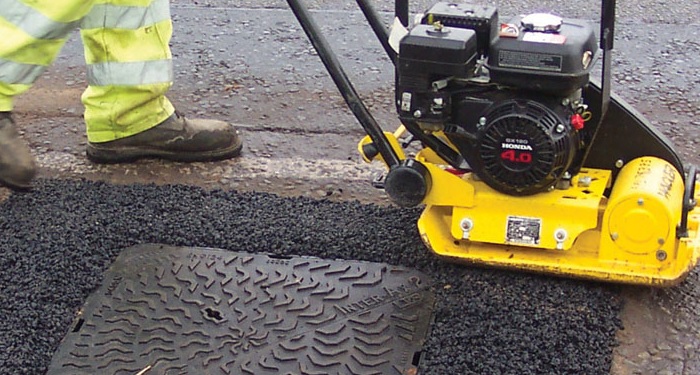
It is far more accessible to regular DIY enthusiasts since it can be purchased from a local or online store. Cold-mix tarmac comes in 25kg bags.
It is a suitable option for a DIY job. Cold-lay tarmac costs about £8 to £15 per bag.
Pros:
- Easy to find
- The best option for DIY enthusiasts
- Becomes more price competitive, the more you buy
Cons:
- Not as cheap as hot-lay for a small job
- Temporary solution
- Will not stick to the surface as effectively as hot-lay tarmac
Hot-Lay Tarmac Cost
The other common option is hot-lay tarmac or hot-mix tarmac. This is usally sold specifically by weight (rather than price by bag), with one tonne of hot-lay tarmac costs about £45 to £60 making it a much cheaper option.
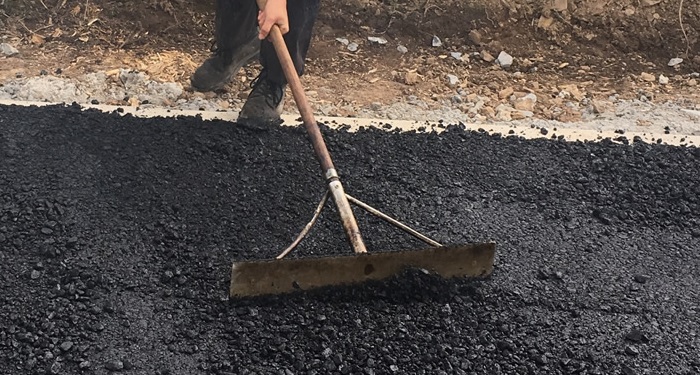
Hot-lay tarmac provides better coverage and adheres to the surface more effectively, making it a permanent solution, unlike for cold-lay tarmac driveways.
Pros:
- Much cheaper for regular projects
- More coverage
- Permanent solution for tarmac for driveway
Cons:
- Can’t be carried in a regular vehicle due to the weight involved
- Must be kept heated on the way to work area
- Unsuitable for a DIY enthusiast
Benefits of a Tarmac Driveway
There are plenty of benefits to having tarmac drives installed, including enhancing curb appeal and providing practical use for parking. Let’s explore some of the top advantages of building a tarmac driveway.
With proper maintenance, tarmac driveways can last up to 20 years, making them a long-term investment.
Durability
Tarmac driveways are known for their exceptional durability and resilience. They can withstand heavy loads and constant use without cracking or breaking. Tarmac driveways are suitable for parking vehicles and can last for many years with proper maintenance.
Low Maintenance
Tarmac driveways require minimal maintenance. They are resistant to stains, oil spills, and weeds. Tarmac driveways are easy to clean and maintain their appearance over time. Regular maintenance can help extend the lifespan of a tarmac driveway.
Easy to Build
In most cases, it should only take a few days to have a tarmac driveway built.
As a result, it’s a relatively straightforward and time-efficient way of transforming the front of your property, both in appearance and for reasons of utility.
Resistant to the Elements
Tarmacs are built to last and are made to endure harsh weather conditions from summer to winter and back.
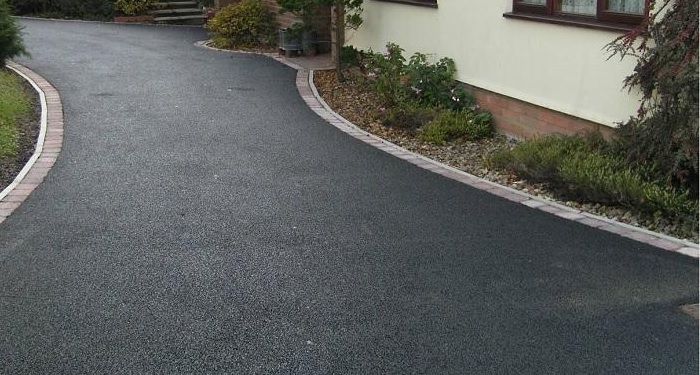
With a long-lasting and durable tarmac driveway, it will mean saving money because of the fact that it’s unlikely you’ll need to perform repairs and maintenance too often.
Cheaper Than Concrete Driveways
Though concrete driveways have their advantages (e.g. lasting up to 40 years and not needing a sealant), tarmac driveways are a lot cheaper.
When it comes to the average cost of a concrete driveway, you’d need to pay about £3,700 to £3,900 to have a 40m² concrete driveway built by professionals but just £2,000 to £2,150 on average for a tarmac driveway.
Cheaper Than Resin Driveways
Installing a resin driveway is another popular alternative, aesthetically pleasing with their smooth finish. However, they tend to cost more than tarmac.
Resin driveways typically costs between £2,000 and £3,200, depending on the resin type and complexity of installation. The price per square metre usually ranges from £40 to £65, although a larger area can work out more cost-effective.
While resin driveways can last around 15–25 years with proper care, they are generally more expensive tarmac and require a specialist tradesmen with the right experience. They can also potentially crack under a heavy weight, so not suitable for commercial use with larger vehicles such as HGVs or delivery vans.
Planning Permission and Building Regulations
Planning Permission for a New Tarmac Driveway
If you are replacing an existing driveway with tarmac, then there's no need to seek planning permission. However, if you’re installing a new tarmac driveway, you’ll need to apply through your Local Planning Authority (LPA). In part, this is due to if you need to create a drop curb or to gain access to the road.
Installing a tarmac driveway as part of a listed building or within a conservation area, may come with additional restrictions and as such, it’s important to contact your local council for advice before proceeding.
Building Regulations for a New Tarmac Driveway
If your project involves altering drainage systems or affects the public footpath or adjoining road, you should consult your local building control department to ensure compliance.
Otherwise, unless you are working on a listed building or within a conservation area, there aren't normally any related building regulations that need to be approved for the work.
How Much Does It Cost to Remove a Tarmac Driveway?
You may wish to have a tarmac driveway removed because you’d like to install a new structure on the land it currently covers (e.g. a garage or another type of outbuilding). When planning a tarmac driveway project, it's important to consider various aspects such as cost breakdowns, selecting the right contractor, and understanding legal considerations like planning permissions.
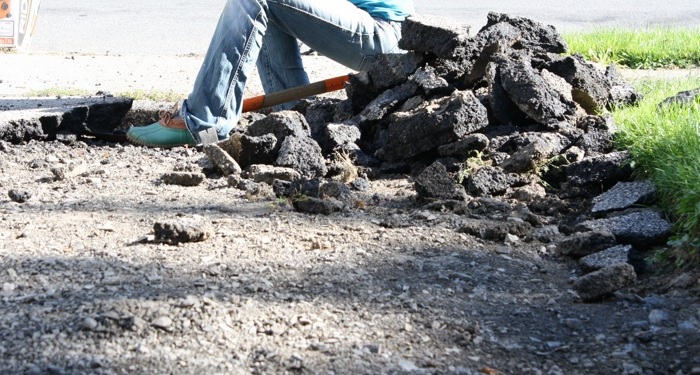
On the other hand, your tarmac driveway may be old and worn down beyond repair, in which case you may want to have a fresh driveway installed, whether made of tarmac or concrete.
On average, it would cost approximately £500 to £1500 to have a tarmac driveway removed.
FAQs
Q: How do you remove oil from a tarmac driveway?
A: An oil stain remover or dish soap will likely suffice best, but there are a whole range of options, and some may work better than others depending on the nature of the driveway of the oil spillage. Baking soda and oven cleaner have both been known to help. You can also leave cat litter on the oil spill overnight to absorb the stain.
Q: How do you prepare a driveway for tarmac?
A: Preparing a tarmac driveway will start with the removal of the previous driveway, the installation of a sufficient membrane, edging, and then a sub-base. However, the exact process can vary between jobs, so always ask the tradesmen if you wish to know more details.
Q: How long does a tarmac driveway last?
A well-laid tarmac driveway typically lasts 15–20 years, and with proper care, it can last up to 25 years. Its lifespan depends on factors like the quality of installation, correct thickness, proper compaction, frequency of use, and exposure to weather conditions such as heavy rain, extreme heat, and UV radiation.
Q: What other options do I have?
A: Resin and concrete driveways are worth considering as alternatives to having a tarmac driveway built. You could also use loose stones, block paving, tar, or chip.

